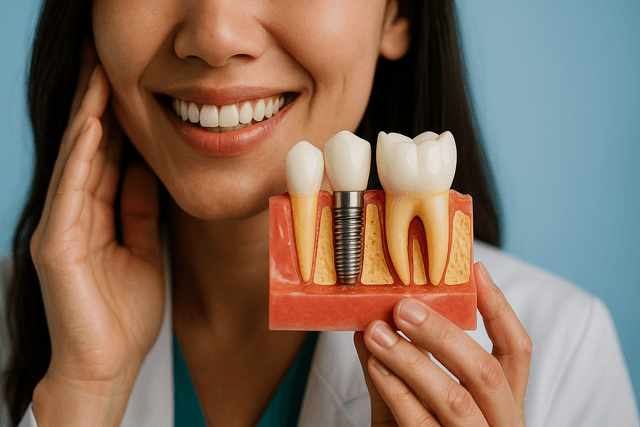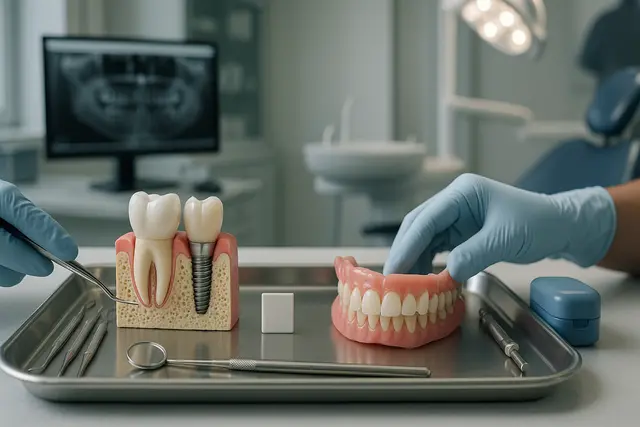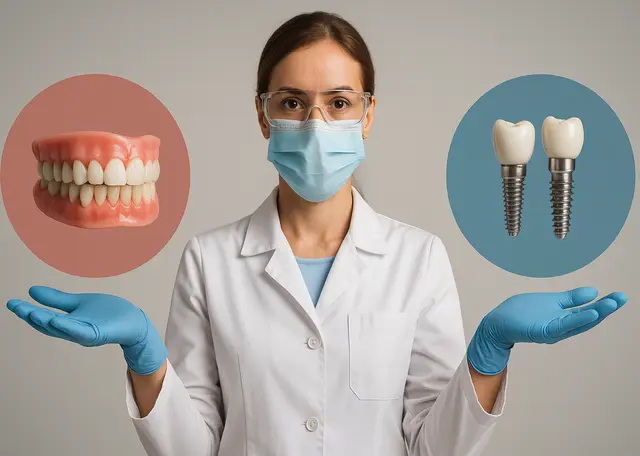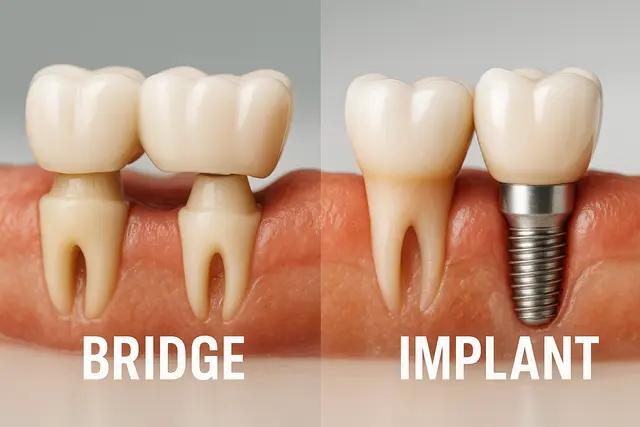Prosthodontics
5 min read
Oct 14, 2025
Do Dental Implants Prevent Bone Loss? Facts You Should Know
Tooth loss affects more than just your smile, it can impact your jawbone, facial structure, and long-term oral health. One of the most common concerns after losing a tooth is bone loss, and many wonder if dental implants can truly prevent it. Let’s explore what really happens beneath the surface when a tooth goes missing and how implants play a role in preserving bone density.

Let’s be honest. Losing a tooth isn’t just a cosmetic issue, it can mess with your confidence, your ability to chew, and yes, the health of your jaw. If you’re considering dental implants, you might’ve heard they can help prevent bone loss. But how exactly does that work? And are implants really better than a denture or bridge?
Grab your favorite beverage, get comfy, and let’s walk through what actually happens when you lose a tooth, and how a dental implant might just be your jaw’s new best friend.
What Happens to the Jaw After Tooth Loss
The moment you lose a tooth, the clock starts ticking. Your jawbone, which once held the tooth root snugly, starts to shrink. This process, known as bone resorption, is your body’s way of reallocating resources. Basically, it figures, “No tooth? No need for all this bone.”
Without stimulation from a tooth root (or something that acts like one), the alveolar bone that holds your teeth in place begins to disappear. This is why people with missing teeth often experience jawbone loss and changes to their facial appearance. It’s not just about looks, either. Bone loss in the jaw can impact how you chew, speak, and even breathe.
Why Bone Loss Occurs When You Lose a Tooth
Here’s the deal: your natural tooth roots are constantly telling your jawbone to keep up the good work. Every bite and chew sends signals to stimulate bone growth. When you lose a tooth, that communication line gets cut.
Bone loss occurs because the jawbone is no longer being used. No stimulation equals no reason for your body to preserve bone tissue. That’s how the loss of bone becomes a long-term issue, especially if you’re not replacing the tooth quickly.
How Dental Implants Help Prevent Bone Loss
So, do dental implants prevent bone loss? Yes, and here’s why.
A dental implant is an artificial tooth root, typically made from titanium. It’s surgically placed into the jawbone, where it fuses with the bone in a process called osseointegration. Over time, this titanium dental implant becomes part of your jaw, acting like a natural tooth root.
This is a big deal. That connection reestablishes the same pressure and stimulation your jaw needs to maintain bone density. So yes, dental implants stop bone loss, and they do it in a way that dentures and dental bridges simply can’t.
Why Dentures Alone Can’t Stop Bone Loss
Here’s a tough truth: while dentures replace missing teeth visually, they don’t stop bone loss. Since they rest on top of the gums and aren’t anchored into the jaw, they don’t provide the stimulation needed to prevent the loss of bone.
Over time, denture wearers often notice their dentures becoming loose, that’s bone loss at work. As the jaw shrinks, the denture no longer fits snugly. That’s one reason implants and dentures is such a hot topic in modern dentistry. Implants preserve the jawbone; dentures don’t.
Considering Dental Implants? What to Know Before Implant Placement
If you’re considering dental implants, the first step is a dental implant consultation. Your dentist will evaluate your bone density, oral health, and whether you might need a bone graft.
Yes, sometimes the jawbone has already lost so much volume that a graft is needed to rebuild it. This artificial bone or graft material creates a stable foundation for the implant. Think of it like prepping the soil before planting a tree, it gives the implant what it needs to thrive.
During the implant consultation, your dentist will also discuss your overall dental health, tooth replacement options, and whether mini implants or traditional implants are best for you.
What the Dental Implant Procedure Involves
The dental implant procedure isn’t as scary as it sounds. After any needed bone graft or preparatory work, the implant is placed into the jawbone. Once healing is complete (and osseointegration has done its job), the top of the implant is capped with a crown that looks and functions like a natural tooth.
Implants are placed with precision and care, and when done right, they’re built to last decades. They also help preserve bone density and maintain your facial structure.
Implants Prevent Bone Loss and Preserve Your Smile
Implants aren’t just about filling a gap, they’re about preserving who you are. When you replace missing teeth with implants, you're investing in your future bone health, your smile, and your ability to chew with confidence.
Plus, dental implants help slow the rate of bone changes and maintain bone height, which means fewer adjustments and more stability in the long run.
But What About Bone Loss With Implants?
Yes, there can be bone loss around dental implants, especially if oral hygiene isn’t on point or if implant placement wasn’t ideal. That’s why working with an experienced dental office and following up regularly with your dentist is key to avoiding dental implant failure.
Successful dental implants rely on healthy surrounding bone and consistent care, just like your natural teeth.
Stop Bone Loss Before It Starts
If you’ve lost a tooth or are dealing with missing teeth, don’t wait. The longer you go without replacing a natural tooth, the more your jawbone may shrink, making future procedures more complicated.
Implants provide a powerful solution to prevent loss of bone and help maintain your smile for life. Dental implants are considered the gold standard in tooth replacement for good reason, they act like natural tooth roots, promote new bone growth, and keep your bite strong.
Schedule an Appointment to Learn More About Dental Implants
Ready to stop bone loss and get your confidence back? Whether you’re comparing implants vs dentures or just curious about the effect of implant dentistry on your oral health, the first step is to schedule an appointment.
A dental implant consultation will help you understand your options, from graft needs to implant surgery, and everything in between. Implants offer more than a solution, they offer peace of mind.
How Do Dental Implants Help Prevent Bone Loss?
Dental implants prevent bone loss by replacing the missing tooth root with a titanium post that stimulates the jawbone, just like a natural tooth. This stimulation, through chewing and biting, encourages the bone to stay strong and maintain its density. The process of osseointegration allows the implant to fuse with the bone, providing the pressure needed to prevent resorption, the natural shrinking that occurs when a tooth is lost.
Why Does Bone Loss Happen After Losing a Tooth?
Bone loss occurs after tooth loss because the jawbone no longer receives stimulation from the missing tooth root. This lack of stimulation signals the body that the bone is no longer needed, leading to bone resorption over time. The result is a gradual shrinkage of the jaw, which can impact your facial appearance, oral function, and ability to support future tooth replacements.
Can Dentures or Bridges Prevent Bone Loss Like Implants?
No, traditional dentures and bridges do not prevent bone loss. They rest on the gums or anchor to adjacent teeth but do not stimulate the jawbone. Without direct bone stimulation, the jaw continues to deteriorate over time. This is why implant-supported solutions are often preferred, they provide functional and biological support that preserves bone health.
What Should I Know Before Getting Dental Implants?
Before getting dental implants, you’ll need a consultation to assess your oral health and bone density. If significant bone loss has already occurred, a bone graft may be required to create a stable foundation. Your dentist will also evaluate whether you’re a candidate for traditional or mini implants and will discuss your medical history to ensure successful healing. Proper planning and care are key to long-term implant success.
Read Next
Related Posts

Prosthodontics
Implant vs. Dentures Pros and Cons: A Deep Dive into Modern Solutions
Missing teeth can impact more than just your smile, they can affect how you eat, speak, and feel about yourself. Fortunately, modern dentistry offers two leading solutions to bring back both function and confidence: dentures and dental implants. Understanding the pros and cons of each can help you make the choice that fits your needs, lifestyle, and budget.
7 min read
Oct 17, 2025

Prosthodontics
Full Mouth Implants vs. Dentures: Which Is Better for You?
When it comes to replacing missing teeth, the choice between full mouth dental implants and dentures can be overwhelming. Each option has its own set of benefits, limitations, and long-term considerations, making it essential to understand what works best for your needs, health, and lifestyle.
5 min read
Oct 17, 2025

Prosthodontics
Tooth-Supported Bridge vs. Implant Comparison: Benefits, Drawbacks, and Insights
Deciding between a dental bridge and a dental implant can feel overwhelming, especially when both options promise to restore your smile and improve oral function. Each solution comes with its own set of benefits, considerations, and ideal use cases, making it essential to understand how they compare before choosing what’s right for you.
6 min read
Oct 17, 2025
Don’t have time to research every dentist around you?
See why 30k+ patients trusted us